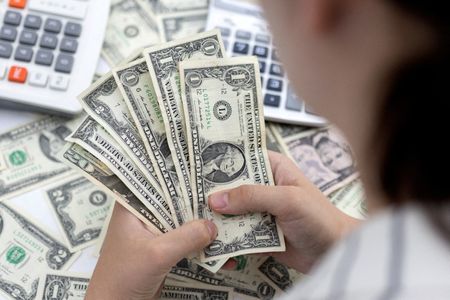
By Tom Westbrook
SINGAPORE (Reuters) – The dollar was riding high on Wednesday, flung to three-month peaks when Federal Reserve Chair Jerome Powell surprised investors by warning that interest rates might need to go up faster and higher than expected to rein in inflation.
The rising greenback broke above its 200-day moving average against the yen for the first time this year in Asia trade, hitting its highest since mid-December at 137.49 yen.
Overnight it had shot more than 1.2% higher on the euro, its biggest one-day move in five months. It last traded at $1.0550 per euro.
The Australian dollar was nursing even larger losses as Powell’s hawkishness contrasted with a softening in tone from Australia’s central bank, consigning the Aussie to a 2% overnight drop to a four-month low of $0.6580. [AUD/]
The U.S. dollar index, which measures the dollar against a basket of six major currencies, jumped 1.3% overnight to a three-month peak of 105.65.
“The latest economic data have come in stronger than expected,” Powell told lawmakers on Capitol Hill, “which suggests that the ultimate level of interest rates is likely to be higher than previously anticipated.
“If the totality of the data were to indicate that faster tightening is warranted, we would be prepared to increase the pace of rate hikes,” he said.
The remarks sent short-term rate expectations higher, with traders now anticipating an almost 70% chance of a 50 basis point rate hike in March, according to CME’s FedWatch tool, up from about a 30% chance a day ago.
Futures imply U.S. rates peaking above 5.6% and holding higher than 5.5% through 2023. Traders have a laser focus on Friday’s U.S. payrolls data and next week’s inflation figures.
“If those data prints exceed expectations at all, based on what Powell said that’d pretty much guarantee a 50-basis point hike in March,” said IG Markets analyst Tony Sycamore in Sydney.
“If the hot data continues to roll into February and March, the U.S. dollar is going to have a very firm tailwind behind it.”
Sterling fell 1.7% overnight to its lowest since late November and was last steady at $1.1832. The New Zealand dollar dropped 1.5% on Tuesday and dipped a tiny bit further in morning trade on Wednesday to a near four-month low of $0.6104.
The blockbuster week of central bank meetings and speakers rolls on later in the day, with the Bank of Canada setting policy and European Central Bank President Christine Lagarde speaking.
The Bank of Canada is seen holding interest rates steady as it grapples with the damage that hikes are inflicting on the economy, which has the currency at a four-month trough of 1.3262 per dollar.
“If the BoC hikes, it will likely add to fears about a housing crash,” said Deutsche Bank strategist Alan Ruskin.
“If they don’t hike, the Canadian dollar will likely fall into a bucket of currencies where the central bank is unwilling to keep up with the Fed.”
========================================================
Currency bid prices at 0101 GMT
Description RIC Last U.S. Close Pct Change YTD Pct High Bid Low Bid
Previous Change
Session
Euro/Dollar
$1.0549 $1.0548 +0.00% -1.56% +1.0551 +1.0543
Dollar/Yen
137.3200 137.1550 +0.10% +4.61% +137.4900 +137.2000
Euro/Yen
144.87 144.68 +0.13% +3.26% +144.9800 +144.6300
Dollar/Swiss
0.9418 0.9422 +0.01% +1.91% +0.9426 +0.9420
Sterling/Dollar
1.1831 1.1827 +0.02% -2.19% +1.1833 +1.1823
Dollar/Canadian
1.3749 1.3755 -0.03% +1.49% +1.3756 +1.3750
Aussie/Dollar
0.6590 0.6585 +0.05% -3.34% +0.6591 +0.6581
NZ
Dollar/Dollar 0.6113 0.6107 +0.10% -3.72% +0.6116 +0.6104
All spots
Tokyo spots
Europe spots
Volatilities
Tokyo Forex market info from BOJ
(Reporting by Tom Westbrook)

